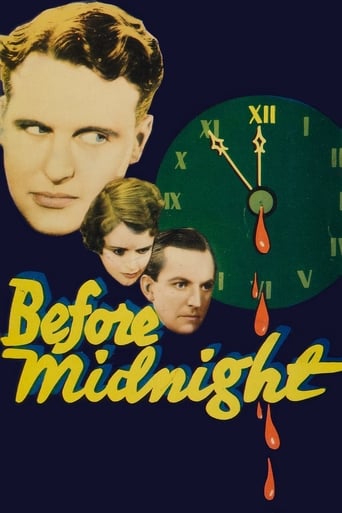JohnHowardReid
Perennial second-lead, Ralph Bellamy, has the star part in the 4-picture "Inspector Trent" series. The first of these Columbia "B" entries, Before Midnight (1933) is heavy on atmosphere but short on credibility. True, the plot presents some fascinating permutations of the usual mystery thrillers. I like the idea of the two principals switching their identities, but writer Robert Quigley is unable to come up with any reason at all for this startling plot development. Yes, a reason is certainly given at the time, but it is later revealed to be a lie! And that's not the only plot twist by far that's just simply left hanging. Nonetheless, Claude Gillingwater battles gamely against the script and right up to the end, almost succeeds in presenting a believable characterization. George Cooper (as Bellamy's offsider), Betty Blythe and William Jeffrey also excel. (Formerly available on a fair quality VintageFilmBuff DVD).
tedg
The early thirties was a time of great experimentation with the detective narrative, leading eventually to noir.This is one of those experiments, and a rather fine one. It has a framing device where an old cop is telling a young one about the famous case from some time back and how a legendary inspector solved it. The case is a good one: an impossible murder, committed according to a centuries old schedule. Mysteries of the Orient. Confusion of roles. Some careful forensics and a bit of adventure.In this case, the mystery is more like a written story than a cinematic one. It even features a few devices associated with writing: the will of course, a fountain pen, a diary, some checks. If you were looking for a fold beyond the framing narrative, you will find it: one character has planned an elaborate "play" within the world we see.Ted's Evaluation -- 2 of 3: Has some interesting elements.
MartinHafer
Ralph Bellamy stars as 'Inspector Trent'--a detective who is trying to solve a murder. However, his method of solving the case seems to be to let the murderer kill off all the other possible so that by the process of elimination he's found the killer! In the very first scene, a guy announces to Trent that he's about to be murdered--and he is! Then, the houseboy appears to be connected to the crime and he's stabbed in the back right before the very eyes of Trent!! At the end, when Bellamy discovers the killer, he deliberately gives the guy ample opportunity to kill himself--thus saving the tax payers from having to pay to incarcerate him!! This is all pretty funny, as the case is apparently being told to an up and coming cop who wants an advancement--and his boss tells him how Trent so masterfully solved the case as an example of great detective work!!! Thank God other 'great detectives' don't work this way!! Fortunately, despite this weird plot element, the solution to the crime is actually really cool and makes this B-mystery well worth seeing. Good acting, a genuinely interesting mystery and a relatively ineffectual detective make this one to watch. Plus, it's nice to see Bellamy in a film where he doesn't lose the girl in the end...which seemed to happen all too often through the 1930s and early 40s!
GManfred
Good, tight murder mystery that is brief and no-nonsense in its approach. It is a pre-code film but there's nothing here that might have been objectionable at the time. Also missing is the 30's habit of inserting comic relief into a story that doesn't need any, and this one doesn't need it. George Cooper plays Stubby, a dim-witted assistant detective who comes off as dim-witted but not as comic relief.Ralph Bellamy is Detective Trent, trying to solve a murder that takes place on a dark and stormy (and very noisy) night in a mansion with the usual suspects roaming around. What strikes you is the tone of all players, and especially Bellamy, as there is not a hint of the good-natured warmth or friendliness normally found in most pictures of this or any other kind - just a group grimly determined to get to the bottom of the proceedings. No jokes, no romance, just the facts.Nevertheless, it is well worth your time. It is an old-fashioned whodunnit that will challenge your own powers of deduction - and no laughing, please.


